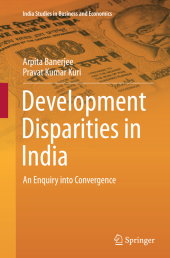 Neuerscheinungen 2016Stand: 2020-02-01 |
Schnellsuche
ISBN/Stichwort/Autor
|
Herderstraße 10
10625 Berlin
Tel.: 030 315 714 16
Fax 030 315 714 14
info@buchspektrum.de |

Arpita Banerjee, Pravat Kumar Kuri
(Beteiligte)
Development Disparities in India
An Enquiry into Convergence
Softcover reprint of the original 1st ed. 2015. 2016. xix, 153 S. 15 SW-Abb., 77 Tabellen. 235 mm
Verlag/Jahr: SPRINGER, BERLIN; SPRINGER INDIA; SPRINGER 2016
ISBN: 813222972X (813222972X)
Neue ISBN: 978-8132229728 (9788132229728)
Preis und Lieferzeit: Bitte klicken
This book highlights the development disparities in India and considers three complex areas of development - economic wellbeing, human progress and agricultural development - over a period of forty years since the 1970s. The novelty of the book lies in is its rich analytical foundation and the use of sophisticated statistical and economic tools to determine the causes of socioeconomic disparity between Indian states. The trends of inequality, polarization and disparity are highlighted with regard to income, human development indicators and agricultural production and productivity. The book also identifies the factors underlying divergence in economic and social activity in India and provides policy suggestions for bringing about more balanced and inclusive development in India.
Chapter 1. Regional Development in India.- Chapter 2. Development Disparities: An Exploration of Past Research.- Chapter 3. Regional Disparity in India: A Research Agenda.- Chapter 4. Regional Inequality and Convergence in Economic Growth in India.- Chapter 5. Regional Disparity and Convergence in Human Development in India.- Chapter 6. Regional Variation and Convergence in Agricultural Development in India.- Chapter 7. Development Disparity in India: A Sum Up.
ARPITA BANERJEE is an academician and researcher. She is Head of the Department (Economics), M.U.C. Women´s College, Burdwan and has been teaching for more than 10 years. She did her Post Graduation from the University of Calcutta and M.Phil from Jadavpur University, Kolkata. She obtained her PhD degree from the University of Burdwan. As an academician, Dr Banerjee specializes in statistics and econometric analysis and planning and development economics, she has been teaching papers of micro and macro-economic theories, development policies, Indian economic planning and statistical analysis to students of economics honours. She is a member of Bengal Economic Association. She has presented a number of papers in several national and international seminars and conferences and has many publications in refereed journals and proceedings. Her areas of interest are development economics, regional disparity, agricultural economics and environmental economics.
PRAVAT KUMAR KURI was born and educated in West Bengal. He obtained a Master´s degree in Economics from the University of Burdwan. He did M.Phil in Economics from Jadavpur University, Kolkata and Ph.D from the University of Burdwan. He started his teaching career as Lecturer at Government College, Itanagar, in 1992 and after that he taught Economics at the post-graduate level at Arunachal University for more than a decade. Dr Kuri subsequently served as Reader at the Department of Economics, North Eastern Hill University (NEHU), Shilong. Currently he is working as Professor at the Department of Economics, University of Burdwan. As Lead coordinator, he has prepared District Human Development Report, Hooghly, West Bengal, published by UNDP and the Department of Planning, Government of West Bengal. Under sole and co-authorship, Dr. Kuri so far has written seven books, important among them are Agricultural Growth and Agrarian Relations: A Study in West Bengal, 2013, Tenancy Relations in Backward Agriculture: A Study of Rural Assam, 2004, Land Reform in Arunachal Pradesh, 2000 and has published a number of research articles in reputed journals of social science. Professor Kuri is actively engaged in research and participated in number of national and international seminars/conferences. His areas of research interest include development economics, regional disparity, agricultural economics, institutional economics, resource and environmental economics.


